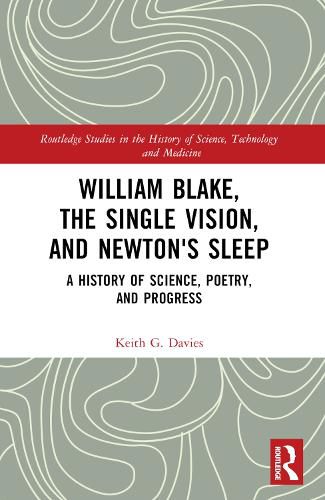Readings Newsletter
Become a Readings Member to make your shopping experience even easier.
Sign in or sign up for free!
You’re not far away from qualifying for FREE standard shipping within Australia
You’ve qualified for FREE standard shipping within Australia
The cart is loading…






The history and philosophy of scientific ideas and the role poiesis and imagination play in our understanding of science and progress are widely explored in this book. By examining the views of William Blake and other poets in the context of twentieth-century philosophers Hannah Arendt, Jacob Bronowski, Martin Heidegger, Bruno Latour and Karl Popper, amongst others, the book takes an eclectic approach drawing on examples from biology, history, literature, philosophy and economics, arguing for the reestablishment of imagination as a central attribute of science that may help to resolve some of our most pressing ecological problems as seen in the context of science and technology studies and what is loosely developing into the discipline of environmental humanities.
Today, influential scientists looking at consciousness dismiss imagination regarding it at best as a mere epiphenomenon, a ghost in the machine, or at worst non-existent and to be denied. In this book, Keith G. Davies, who sees C. P. Snow's debate on the separation of the arts and sciences as alive and well, traces the schism back to Plato but more importantly to the seventeenth century and David Hume's removal of imagination in the conjunction between our observation of causes and their effects. Through extensive research and use of poetry, this book offers an alternate understanding of science with imagination and its continued significance in today's world.
This book is an excellent reference book for postgraduate students, professional researchers, William Blake scholars and the pejoratively labelled interested laymen with concerns in ecology and environmental humanities through offering a new perspective on the history of science and the role of imagination within this field.
$9.00 standard shipping within Australia
FREE standard shipping within Australia for orders over $100.00
Express & International shipping calculated at checkout
The history and philosophy of scientific ideas and the role poiesis and imagination play in our understanding of science and progress are widely explored in this book. By examining the views of William Blake and other poets in the context of twentieth-century philosophers Hannah Arendt, Jacob Bronowski, Martin Heidegger, Bruno Latour and Karl Popper, amongst others, the book takes an eclectic approach drawing on examples from biology, history, literature, philosophy and economics, arguing for the reestablishment of imagination as a central attribute of science that may help to resolve some of our most pressing ecological problems as seen in the context of science and technology studies and what is loosely developing into the discipline of environmental humanities.
Today, influential scientists looking at consciousness dismiss imagination regarding it at best as a mere epiphenomenon, a ghost in the machine, or at worst non-existent and to be denied. In this book, Keith G. Davies, who sees C. P. Snow's debate on the separation of the arts and sciences as alive and well, traces the schism back to Plato but more importantly to the seventeenth century and David Hume's removal of imagination in the conjunction between our observation of causes and their effects. Through extensive research and use of poetry, this book offers an alternate understanding of science with imagination and its continued significance in today's world.
This book is an excellent reference book for postgraduate students, professional researchers, William Blake scholars and the pejoratively labelled interested laymen with concerns in ecology and environmental humanities through offering a new perspective on the history of science and the role of imagination within this field.